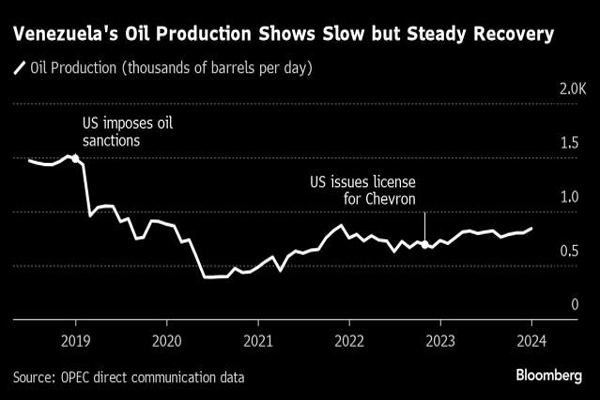
Nicolle Yapur and Jim Wyss, Bloomberg News
CARACAS/SAN JUAN, Puerto Rico
EnergiesNet.com 02 26 2024
At the height of Venezuela’s oil go-go days, tankers fanned out across the Caribbean, handing out 200,000 barrels a day to a constellation of small, mostly poor, islands. The fact that those countries racked up huge debts and paid part of the bill with things like black beans and peanuts mattered little to Hugo Chavez as he parlayed the bonanza into global fame as the leader of what he called 21st century socialism.
Two decades later, impoverished and desperate for cash, Venezuela is trying to collect old debts from the Petrocaribe program. Last month, it received a $500 million payment from Haiti — the poorest country in the hemisphere — to cancel what had been a $2.3 billion debt, according to documents seen by Bloomberg and people familiar with the matter. It’s working on similar transactions with other nations, the people said.
The deal with Haiti came together after the US Treasury granted the country a license to transfer the money from an escrow account through the international banking system. For Haiti, a chronically crisis-torn country, clearing the debt helps it move forward with the International Monetary Fund on a potential loan package.
Representatives for Venezuela, Haiti and various agencies involved in the deal didn’t respond to messages seeking comment. A spokesperson for the US Treasury said the Office of Foreign Assets Control doesn’t comment on individual licenses.
For Venezuela and its current leader, Nicolas Maduro — who took over after Chavez died in 2013 — the agreement marks another step in its effort to regain international recognition after years of economic collapse and international isolation. The government and its state-owned oil company have themselves been in default for years on global bonds and owe China billions for bilateral loans.
‘Arc of Energy’
During the boom years of runaway global prices for crude, Petrocaribe formed part of the broader largesse that Chavez leveraged to curry an international following. He handed out heating oil to poor residents in the Bronx, New York, bankrolled cash-strapped Argentina and vowed to finance mines and refineries for Niger and Mauritania.
“We want to make an arc of energy cooperation in the region,” Chavez said at the summit to launch Petrocaribe 2005, which Cuba’s Fidel Castro and a dozen other heads of state attended.
Under the agreement, Venezuela sold oil to 18 countries, allowing them to finance most of the bill for as long as 25 years at an interest rate of 1% to 2%.
They were allowed to pay part of the bill in kind: Guyana sent rice; Nicaragua shipped cattle; Jamaica contributed cement materials; for Cuba it was doctors. Sometimes, it was peanuts or beans.
In turn, Venezuela secured political support, enough, at times, to block proposals against the government at the Organization of American States, said David Goldwyn, the chairman of the Atlantic Council Global Energy Center’s Energy Advisory Group.
“Venezuela did something for them that Western countries didn’t: They were actually helpful with financing at a time when countries needed it,” he said.
All that aid, though, helped fuel a historic economic collapse, marked by hyperinflation and the worst humanitarian crisis in Latin America’s history.
Even as global prices for crude fell, Maduro kept shipping oil to the Caribbean under generous terms.
“The cost for Venezuela was clear: when oil prices dropped in 2014, the country had no way of tackling it,” said Francisco Rodriguez, an economics professor at the University of Denver.
When the program came to an abrupt halt after the US sanctioned Venezuela’s oil industry in 2019, about $6 billion in receivables had accumulated from Petrocaribe and other bilateral debt agreements, according to estimates from EMFI Securities. The calculations exclude Cuba, which has a separate oil supply agreement, the terms of which are not made public.
Venezuela has only recently started to collect on those debts after the US granted sanctions relief in exchange for Maduro’s pledge to work toward free and fair presidential elections, scheduled to take place later this year. Those relations though have grown tense as the vote approaches. Washington has threatened to put some of the sanctions back in place if Maduro doesn’t meet a series of political agreements.
Venezuela, meanwhile, is pushing ahead with debt collection efforts. This month, Vice President Delcy Rodriguez visited officials in Grenada, which has said it was discussing a payment plan for its Petrocaribe debts. And officials are nearing a deal with Belize to cancel its debt for between $129 million and $164 million, according to people familiar with the negotiations.
Leaders of the Caribbean have urged Venezuela to relaunch the program and Maduro has said it’s a goal. In late 2022, Venezuela shipped 23,000 barrels of diesel to Saint Vincent and the Grenadines, a political ally.
However, the country only produces about a fourth of what it used to, with output of about 840,000 barrels per day, according to OPEC data. And a portion of that production is earmarked to paying back the vast debts Venezuela itself racked up while it was shipping oil to its neighbors.
bloomberg.com 02 23 2024







